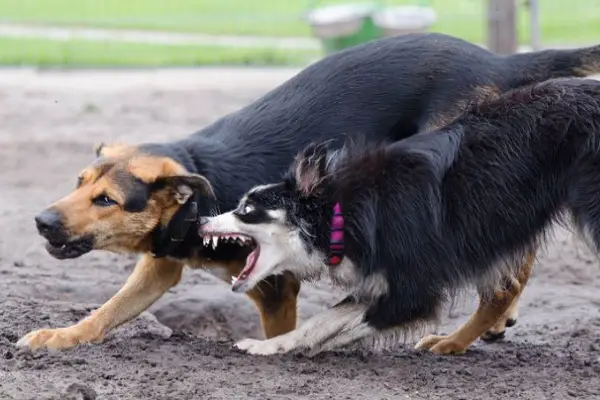7 Causes & Control of Border Collie Aggression

Every dog can show aggression depending on the situation at hand, some dogs are more aggressive than others, let’s discuss border collie aggression.
This post will cover signs of aggression and causes of aggression in border collies, then how to control and resolve aggression in border collies.
If you are interested in all these topics, keep reading!
Border Collie Aggression
Are border collies aggressive? Border collies are regarded as being a non-aggressive dog breed that makes great family pets.
Border collies are known for being courteous and having an outgoing demeanor, as well as being friendly dogs.
If left alone for an extended period of time, border collies may become violent in an attempt to vent their discontent.
Because border collies were bred for herding, they might still show characteristics of hostility if not properly taught.
Border collies can only become aggressive due to a lack of socialization, illnesses, abuse, fear, neglect, anxiety, hormonal fluctuations, and lack of proper training.
Causes of border collie aggression
Some of the most common reasons or situations that cause border collies to become aggressive are as follows:
Poor socialization is very dangerous for all dogs not just the border collie.
It can lead to lots of behavior problems in border collies such as unnecessary barking, increased risk of aggression towards other pets.
If you don’t socialize with your border collie while he’s a puppy or wait until he’s an adult, he may not know what to do or how to act with other people.
Introducing them to a wide range of pets, people, and circumstances can help them discover that no one is a threat.
To put it simple, lack of proper socialization in border collies increases the risk of aggressive behaviors.
2. Neglect or abuse by owner
When you neglect or abuse your border collie there is a high risk of your border collie developing aggressive behaviors.
When your border collie does anything wrong, instead of shouting at him, discipline him and make sure he knows.
Ensure that your border collie is consuming good food and has access to clean, fresh water.
To reduce the chance of aggression, give your border collie the attention and exercise he or she requires, as well as grooming.
Locking up your border collie, starving them for doing something wrong, beating them up, rubbing their mouth against their poop or pee are simple ways you abuse them without knowing.
3. Fluctuations in body hormones
During mating season, your border collie will become aggressive toward other dogs, including their owners or other household pets.
When your border collie tries to mount other dogs, he’s trying to prove his dominance in front of them.
Neutering is a possible solution, but see your veterinarian first because it may have harmful implications in some cases.
When dogs are in their heat period they tend to produce hormones that make them restless and risk of aggression.
4. Frustration or depression
Frustration or depression is one of the most common reasons of aggressiveness in dogs, not only in border collies, but in all dogs.
Irritated or depressed Border Collies may bite, bark, chew belongings, or even try to exit the house.
A lot of reasons contribute to a border collie’s high degree of antagonism when he is unsatisfied.
Leaving your border collie alone at home for too long, paying less attention than normal, disregarding your border collie, and so on.
Border collies are herding dogs, therefore loud noises or abrupt changes in routine can frighten and unsettle them.
All of this can lead to excessive frustration and unhappiness, which can escalate to aggressive conduct.
5. Lack of mental stimulation or exercises
You already know border collies are a working and active breed of dog, which means they need lots of mental stimulation activities.
In the absence of proper mental stimulation activities or regular exercises, border collies becomes bored and there is a high risk of aggression.
Border collies are high energy dogs that are not for lazy owners and require daily exercise to stay happy and healthy.
Boredom or loneliness increases the risk of aggression behavior in border collies, so stay off this breed if you are lazy.
6. Illnesses
Border collie aggression can be triggered by chronic illness such as joint pains or arthritis.
Aggression in your border collie might also be caused by brain tumors, seizures, neurological issues, or thyroid problems.
As a result of health concerns like these, even the most well-trained dog or the most even-tempered border collie might turn aggressive.
If you feel this is the reason of your border collie’s violent behavior, consult a veterinarian immediately once.
It’s tough to see these problems on your own, so see a veterinarian and get your pet the help he or she requires.
7. Traumatic events
Traumatic occurrences are widespread in dogs, and one of the most common reasons of aggressive behavior in border collie is traumatic incidents.
Rescue dogs suffer from anxiety or post-traumatic stress disorder as a result of previous trauma, so if you will adopt a border collie, check its history.
Any border collie who has been through trauma before and was not properly fixed is at danger of having behavioral problems.
Note that border collies that have lived in a hostile or harsh environment are more prone to have emotional problems.
As a conditioned self-protective response, they feel afraid and angered which leads to unnecessary aggression in border collies.
Common signs of border collie aggression
The following are some of the most common aggressiveness signs in border collies:
- Hard staring that was intense and profound.
- Barking that is excessively low-range or high-range.
- Continuous snarling and snapping
- On provocation, your border collie always stand tall.
- On provocation, your border collie keeps his ears erect.
- Increasingly lunging behavior.
- On any provocation, move your body stiffly from side to side.
- The border collie barks wildly when strangers or other dogs approach.
Ways to prevent or control border collie aggression
Some strategies for preventing or dealing with border collie aggression include:
1. Resist and avoid harsh training sessions
Many dogs grow even more aggressive as a result of harsh training methods like prongs, shock collars, and other similar devices.
Always avoid striking your border collie in the face for not following your training sessions strictly.
Slapping, hitting, or other harsh punishments will simply make your little dog more fearful or aggressive.
During any training sessions, avoid using harsh or punitive approaches; if your border collie isn’t performing it correctly, keep calm and start over.
2. Avoid punishments
Harsh punishments could simply lead to border collie aggression before you know it.
Border collies are one of the smartest breed of dog all you need is to be a little patient and train them to your standards.
Never punishment them for not following your corrections, start all over again when they fail.
3. Provide regular mental stimulation
Border collies are a working breed of dogs that need to be kept active to avoid getting bored which leads to aggression.
If you don’t provide your border collie enough mental and physical stimulation, he or she may acquire undesirable habits and behaviors.
Because of their athletic attitude, your border collie will enjoy a daily routine of 30 to 50 minutes.
Take your border collie for walks and short runs to support healthy growth.
Toys, video games, TV shows, and other forms of amusement are also available. All of these activities will keep them happy and healthy.
4. Socialize your border collie
Allow your border collie to socialize with other dogs as well as people.
In a non-threatening and suitable manner, introduce them to other dogs or humans.
Don’t forget to thank your border collie if you’ve had nice interactions with them and they haven’t bothered you.
When your border collie is with other people, keep an eye on them since they can get irritated or enraged at any time.
If they’re hostile, get rid of them right once to avoid their biting someone.
Do not feed, pet, or carry your border collie if they look angry or violent in the company of other dogs or humans.
5. Never punish your border collie aggression
Punishing your border collie for being aggressive nearly always backfires, worsening the situation.
If you hit, yell, or use any other unpleasant method to deal with a growling dog, the border collie may feel obligated to bite you in self-defense.
As a result of the punishment, your border collie may bite someone else without your knowing.
Border collies snarl at children to convey their unhappiness with their presence.
If you punish a border collie for growling, he may bite instead of alerting you the next time he feels threatened.
6. Use positive reinforcement
You’re reminding your border collie that this is what you expect of him when you thank him for doing something good.
Positive reinforcement techniques like these encourage your dog to repeat his good behavior, which will become a habit over time.
Negative reinforcement methods, on the other hand, might hurt your border collie.
Most of the time border collie aggression can be addressed using positive reinforcement and not negative reinforcement.
7. Provide your border collie basic needs
Border collies like being lavished with affection and attention, which may contribute to their lack of aggression.
When your border collie does something you like, give them a treat, and connect aggressiveness with undesirable conduct.
Praise them and give them cookies as a reward. If they engage in behavior that you dislike, ignore them for a while.
You’ll need to be persistent and patient to help your border collie figure out which activities he enjoys and which he doesn’t.
Remember: Naturally border collies are not an aggressive breed of dog but can become aggressive due to their owner’s actions.


![Are Beagles Chewers [9 Reasons For Chewing] Are Beagles Chewers](https://petcreeks.com/wp-content/uploads/2023/05/Are-Beagles-Chewers-768x555.jpg)
![How to Know if Your Dog is Deaf [12 Signs & Tips] How to Know if Your Dog is Deaf](https://petcreeks.com/wp-content/uploads/2023/09/medicine-5003631_640-1.jpg)

![10 Causes of Shih Tzu Itching and Licking [Useful Tips] Shih Tzu Itching And Licking](https://petcreeks.com/wp-content/uploads/2023/04/Shih-Tzu-Itching-And-Licking.jpg)
![Can Beagles Eat Strawberries [How To Feed] Can Beagles Eat Strawberries](https://petcreeks.com/wp-content/uploads/2021/04/Can-Beagles-Eat-Strawberries.jpg)